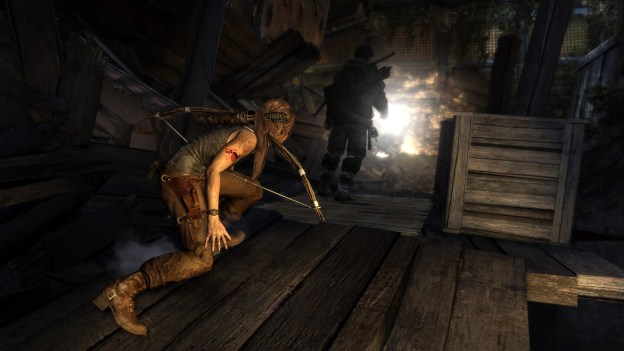
Things are not well over at Square-Enix. Even before reporting its full earnings for the fiscal year that ended in March, the company announced to its investors that it would incur an extraordinary loss due to a massive overhaul of the company and its many international subsidiaries. Losses were so severe that the company had to go through its first major change in leadership in over a decade, with CEO Yoichi Wada stepping down and CFO Yosuke Matsuda taking his place. The other big cause of Square’s disappointing revenue, at least according to Wada, is the company’s console games like Sleeping Dogs, Hitman: Absolution, and even Tomb Raider, a game that’s only been out a month.
So how are games that respectively sold 1.5 million, 3 million, and 3.5 million copies disappointing? By most standards those results would be considered at least modestly successful, but not to Square-Enix. Wada explained in a new briefing released to investors on Monday how it gets away with saying these titles are disappointments.
“Let’s talk about Sleeping Dogs: we were looking at selling roughly 2 – 2.5 million units in the EUR/NA market based on its game content, genre and Metacritic scores,” said Wada, “In the same way, game quality and Metacritic scores led us to believe that Hitman had potential to sell 4.5 – 5 million units and 5 – 6 million units for Tomb Raider in EUR/NA and Japanese markets combined. Of course, we want to hedge risk in budgeting these units directly into the forecast, therefore we base the forecast on 80 – 90 percent of the total sales potential of each title. However, it is disappointing that our results fell below these marks.”
As a result of sales that are “far weaker than we ever imagined” in North America and Europe, Square-Enix is going on a slash and burn campaign, cancelling projects and thinning staff. Across all of its operations in Japan, Europe, North America, and even new mobile operations in Mexico, India, and elsewhere, the reorganization is going to cost Square-Enix approximately $101 million.
That $101 million loss is just the latest to slam Square-Enix under Wada’s watch. The fiasco that was Final Fantasy XIV’s initial release caused Square-Enix to lose $150 million in fiscal 2011. That loss highlights the unspoken cause of Square-Enix’s woes in fiscal 2013, though. Square-Enix had unreasonable earnings expectations for its Eidos produced console games, because the company continues to spend scads on developing HD PC and console games in Japan without ever releasing any product. Final Fantasy XIV: A Realm Reborn and Final Fantasy Versus XIII have been in production for three and seven years respectively. If Square wants to point the finger at someone for poor earnings, look to the mismanagement of its Japanese development teams, not a multi-platinum seller like Tomb Raider.


